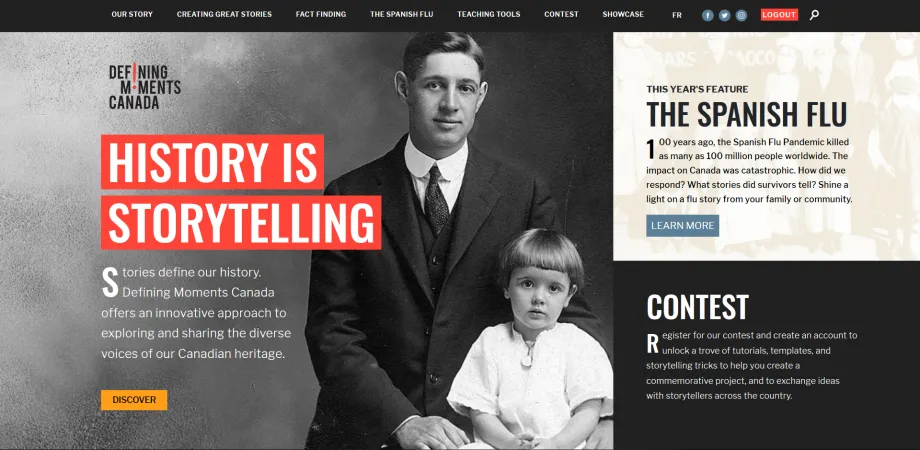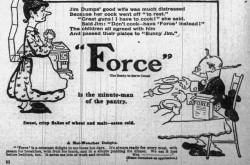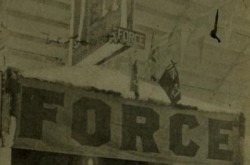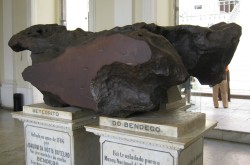Digital storytelling tools empower students to share Canada’s history
Over the last few months, there has been an exciting surge of momentum as Canadian students and teachers engage in the art of digital storytelling through an ongoing, national commemoration of the Spanish flu. As the Project Coordinator with Defining Moments Canada — an organization that helps to tell the stories of Canada’s pivotal historical moments — it has been encouraging to see such an outpouring of interest in one of the most fascinating chapters of Canadian history, whose stories are so rarely told.
We launched the Defining Moments Canada website last May, and it has steadily grown — thanks to a number of valuable additions to our digital offerings. With help from our growing list of partners, we've been able to bring together all sorts of storytelling tools to help Canadians bring stories to life, and gain a new perspective on the country at the end of the First World War. Whether you want to skim the surface of Spanish flu history or take a deep dive, we have you covered; and if the Spanish flu isn’t your cup of tea, we have a wealth of resources to help you discover what is:

Elizabeth “Kirkina” and another patient, Ben Cumby, at Indian Harbour, 1908. The Rooms, VA103-12.1.
Our Micro-histories section is a wonderful place to start if you are looking for some short introductions to the Spanish flu experience in Canada. There’s something to pique everyone’s interest: whether you’re curious about how the average Canadian would have fought the flu, or how immigrant communities fared during the pandemic; in this section you’ll get a taste of what it may have been like to be alive during the most devastating pandemic in human history. Personally, my favourite story is that of Elizabeth “Kirkina” Jeffries Mucko, an Inuit woman who survived not just the Spanish flu, but many other hardships as well, and went on to live an extraordinary life afterwards.
On the other hand, our Spanish Flu Themes section is for you if you already know a bit about the Spanish flu, and now you want to really dig into an aspect of it that fascinates you. How did the flu come to bear on the Stanley Cup final of 1919? What about the end of the war? Why were so many young people killed by this flu, when usually the flu is most fatal to the very young and very old? With contributions from top scholars and flu experts from around the world, this section is bound to get you thinking.
I would be remiss not to mention the excellent series of Lesson Plans that have been created for us by top-notch educators from across the country. Available for a wide array of subjects and interdisciplinary in nature, these lesson plans can help you bring the flu to life in your classroom (though not literally!). Among others, there are plans for Indigenous studies, arts, geography, science, and health and nutrition. Those who are registered for our contest get access to exclusive resources developed in partnership with The Critical Thinking Consortium — all designed to facilitate inquiry into the Spanish flu. These in-depth lessons give you all the tools you need to have your students create meaningful analyses and projects on the Spanish flu.
The foundation of our website, however, is our Creating Great Stories and Fact Finding sections. Unlike the other resources, these are not specifically oriented around the Spanish flu; they are meant to give you the know-how you need to look into any topic of your choosing, and from the information that you collect, weave a compelling narrative in whatever form strikes your interest. With useful templates, downloadable organizational documents, and an in-depth look at how to make the most of Google, this rigorous and nuanced approach to storytelling and research is the backbone of our project.
All of these resources are great starting points to begin your research for our national contest, Recovering Canada. Whether Kirkina’s story has you wondering how Indigenous communities in your area fared, or our storytelling tips have inspired you to investigate and share the story of your family during this time, there are a multitude of ways you could create a fascinating digital project, and enter with your community, museum, school, or university.
Our winners will earn some great prizes, and will also have the opportunity to donate vaccines in their communities through ImmunizeBC. We’ve already received some top-notch contest entries, and we’ll continue to receive submissions until April 10, 2019. We at Defining Moments Canada can’t wait to see what other digital stories are shared by creative Canadians across the country!
















